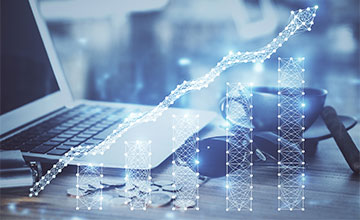Based on archaeological evidence, accounting is one of the oldest professions known to the world, with its origins dating back to as early as 2,000 to 3,300 BC, when societies in Egypt and Mesopotamia started trading and inscribing records on clay tablets. Since then, the accountant’s job description has evolved radically as a result of each era’s emerging technologies.
From Clay Tablets to Mobile Accounting
As a start, the progression from clay tablets to pen and paper and now digital spreadsheets has reduced the time required for bookkeeping. From abacuses and calculators to the automation of calculations, accountants have most recently been spared the hassle of pouring through spreadsheets for hours to ensure that processed figures are correct.
The profession today relies on a different form of ‘tablets’ – i.e. iPads and other connected devices with easy access to web-based software. Mobile applications like SAP Business One for iOS or Android, for instance, allow accountants to easily track and approve invoices and expense claims while on the go.
Beyond tallying columns of financial data, the accountant is now also a company’s finance manager – and perhaps governments’ macroeconomic policy makers. Robert Muldoon was Prime Minister of New Zealand for nine years from 1975, including those made turbulent by high inflation. He was, by profession, an accountant. It’s even been reported that three percent of the UK’s members of parliament have an accounting background and there are at least eight accountants in the current US congress.
While accountants turned country leaders are not the norm, this novel trend is perhaps a small indication of technology’s potential to not render accountants redundant, but instead free them from doing manual and tedious tasks and enable the elevation of interpretation and predictive skills that help their organisations formulate financially sound and profitable policies.

On that note, here are a few hot technologies – at different stages of maturity and adoption – that are being used in modern day accounting and are changing our industry as a result.
Accounting’s Cloud Computing Revolution
Cloud computing is a type of internet-hosted computing that provides shared computer processing resources and data to computers and other devices on-demand. Extended to enable the development of the mobile applications we mentioned above, accountants can now work from virtually anywhere.
The ability of cloud infrastructure and cloud-based software to deliver financial data and reports in near real-time opens new ways of collaboration with clients, along with information backups that guarantee safety and are yet easily accessible by both the client and the accountant.
While many accountants are already using the cloud, the adoption of this technology will only continue to expand – with a larger portion of business operations and applications becoming cloud-hosted. Cloud-hosted applications, also known as Software-as-a-Service (SaaS) applications, are set to account for more than US$85 billion of organisations’ IT spent in 2020 and remain the largest segment of the world’s US$206 billion market for public cloud services.
A subscription agreement is all that’s required for organisations to store and access data and utilise in-built and modular tools from any location with internet access. Asset management, expense claims, purchase orders, payroll and multi-currency accounting, etc. – these are just some of the tasks that an accountant can easily handle with the help of cloud-based or SaaS accounting applications.
The significantly lower cost of developing and distributing cloud-based software has even allowed traditional enterprise technology vendors to build niche solutions for underserved enterprise customer segments.
As an example, there used to be a gap in accounting software solutions for companies generating between SG$50 million to SG$1 billion in annual revenue. Such businesses would often either use basic accounting software designed for small businesses – such as QuickBooks – and lack many necessary capabilities, or they would go to SAP for a sophisticated and more comprehensive enterprise resource planning (ERP) solution that their operations are not yet ready for. This goldilocks zone has now been filled by middle tier, cost-friendly cloud-based software like SAP Business One, which is ‘plug-and-play’ and integrates with a variety of other B2B software applications for all sorts of business needs.
With suitable cloud-based systems for organisations of all sizes now accessible, accountants can save their clients’ time and money by streamlining processes and freeing up time for other strategic tasks. This is especially vital for small and medium businesses where budgets are tight and every extra hour for product or business development counts.
RPA and AI Accounting Next in Line
The cloud provides outsourced access to the intense processing power many organisations lack, which makes it the gateway to the next technology that is transforming the accounting profession – artificial intelligence.

Automation in areas like data collection and processing is already transforming accounting and delivering greater productivity and cost savings. Within the next few years, most finance teams will be working in environments with even deeper levels of automation.
One of the most noteworthy examples is robotic process automation (RPA), which research shows can reduce repetitive data entry tasks in areas like accounts payable, tax accounting and financial closings, and automate processes by up to 80 percent. This is core to accountants being able to take on more of a consultant’s role to clients.
RPA and AI will also have a complementary relationship. Given that critical information like the dollar amount or invoice number can be in a completely different place on different documents, workflows of the future will require AI to process a new invoice from a new supplier and to understand the value of the invoice, the due date and the payment terms. RPA will then speed up data entry from existing supplier invoices that are in an established, well-understood format.
UiPath, for example, has already developed the above mentioned capability, using sub-categories of AI technology like Computer Vision, which enables human-like recognition of user interfaces, and a mix of other intelligent algorithms, optical character recognition (OCR), text fuzzy-matching, and an anchoring cloud infrastructure to tie it all together.
This allows UiPath’s ‘robots’ to actually ‘see’ the document screen and visually identify all its elements, rather than rely on the document’s hidden properties, IDs, and other metadata. When combined with ERP systems that have in-built accounting modules, UiPath’s combination of AI and RPA models will self-learn and improve over time as more users interact with them and use them in workflows.
As another example, Certified Public Accountants (CPAs) within audit firms will become increasingly dependent on data-driven and AI-powered tools. Assuming that audit clients have deployed RPA and AI technologies, accounting firms can then perform more comprehensive analyses of a client’s financial statements, as opposed to evaluating a sampling of the data.
This gives accountants the ability to produce higher quality audit results based on a higher level of analytical precision, which is undoubtedly of significant value to institutional and retail investors. At the end of the day, the quality of AI-powered auditing is dependent on the quality of data the clients provide, which is a function of their investments in technology.
As explained in another piece, technologies like RPA and AI are not displacing accountants. Instead, these technologies are augmenting our technical proficiencies, critical thinking ability and problem-solving skills to make more insightful decisions, reduce risks and increase the efficiency of producing financial statements and tax filings.
According to reporting by Bloomberg and data from LinkedIn, job listings requiring skills related to AI, machine learning and data science increased nearly 60 percent in the past year. The onus is therefore on accountants to acquire the expertise needed to wield these tools effectively.
Blockchain’s Impact on Auditing
Lastly, blockchain technology, also known as distributed ledger technology (DLT), allows a massive global network of computers to record each transaction, making the records virtually tamper proof. While it has become famous for powering cryptocurrencies, the technology itself has broader applications.
In current accounting practices, records are maintained and stored in a centralised location, typically in the database of a cloud-based accounting software application. This model of accounting is based on a double-entry system.
In this system, the accountant will enter all records and reflect all the necessary changes per the client’s needs. When accounting information is needed by the client or a regulator, the accountant will retrieve the data and present it to the requesting party. Only the accountant and auditor have direct access to the centralised ledger.

DLT adopts a different approach. In this instance, records will be entered, maintained, and stored in a distributed ledger that is always accessible by the relevant parties – the accountant, auditor, client, and the regulator. Blockchain thus employs a multiple-entry bookkeeping model.
The good thing about this is that all entries are distributed and cryptographically sealed, making it practically impossible to destroy or manipulate information, and preventing people from cooking the books. It is therefore possible that the auditor of the future needs to be a DLT expert who is trained to identify and report ways in which blockchain technology can be abused.
While the adoption of blockchain technology is still in its relative infancy, banks are already exploring early use cases via the R3 consortium, their own IT initiatives, or by partnering with specialist vendors like Ripple. The ‘big four’ of KPMG, Ernst & Young, PwC and Deloitte are first movers in investigating the possible applications of blockchain in accountancy. In addition, enterprise technology vendors like SAP have released Blockchain-as-a-Service (BaaS) offerings, which allow organisations to use the technology alongside cloud-based ERP or accounting software, and amalgamate all of these with AI to become an ‘intelligent enterprise’.
Many organisations are currently reviewing their business models and assessing the need to implement a blockchain solution. However, it’s essential to keep in mind that problems should not be created to implement blockchain. For sectors that have found a solution in other technologies, there may not be a need for DLT implementation.
Accounting by No Means a Sunset Industry
As we look ahead just a few years, we can start to see where and how cloud computing, RPA, AI, blockchain and other innovations to come, are likely to transform the accounting sector. Technology will not turn accounting into a sunset industry but mark the dawn of accountants playing a greater role in developing business strategies – and perhaps even public policy.
To meet the needs of their firms and clients, next generation accountants must stay up to date with technological trends, optimise and adapt current accounting software, and remain open to learning about new innovations that are designed to interplay with existing ones.




